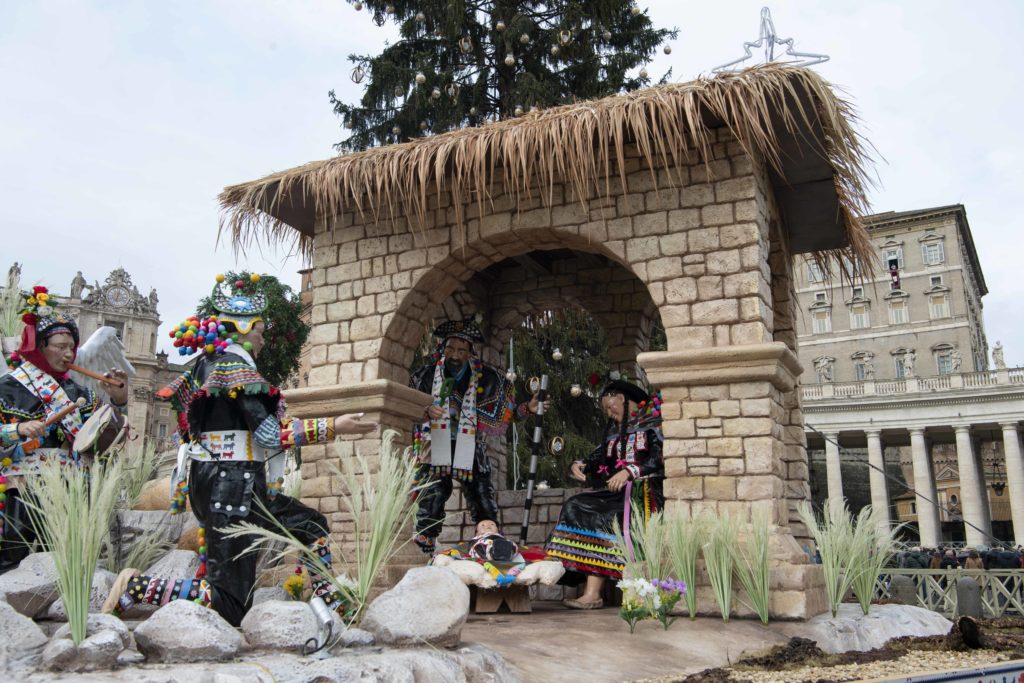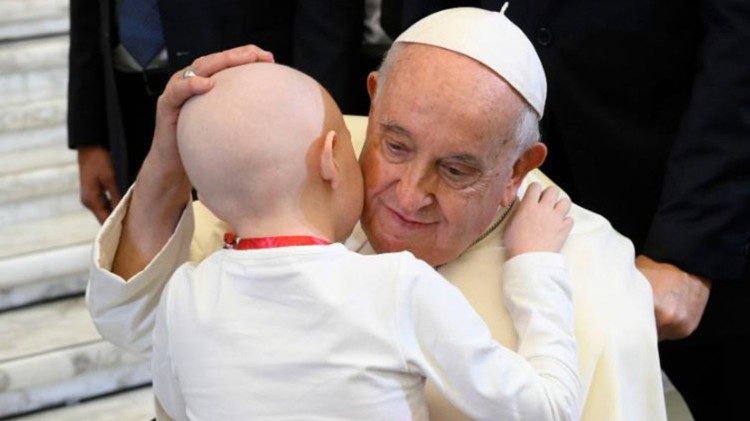Pope Francis Celebrates Families at Angelus
'Let us Contemplate in Amazement the Beauty of This Mystery'

Pope Francis celebrated families in his commentary today before praying the noonday Angelus with the faithful gathered in St. Peter’s Square. He also stressed the importance of families in his Letter to Married Couples for the “Amoris Laetitia Family” Year, 2021-2022, released today by the Vatican.
“Today we celebrate the Feast of the Holy Family of Nazareth. God chose a humble and simple family through which to come into our midst,” the Holy Father said. “Let us contemplate in amazement the beauty of this mystery, emphasizing two concrete aspects for our families.”
- “The family is the story from which we originate. Each one of us has our own story. None of us was born magically, with a magic wand. We all have our own story and the family is the story from which we originate.”
- “We need to learn each day how to be a family. In the Gospel, we see that even in the Holy Family things did not all go well: there were unexpected problems, anxiety, suffering.”
Following the praying of the Angelus, the Holy Father returned to the topic of families. However, in this instance, it included a warning.
“I have a concern, a real concern, at least here in Italy: the demographic winter,” Francis said. “It seems that many couples prefer not to have children or to have only one child. Think about this. It is a tragedy.
“A few minutes ago, I saw on Sua Immagine how they were speaking about this serious problem, the demographic winter. Let us do everything possible to regain an awareness to overcome this demographic winter that goes against our families, about our country, even against our future.”
Following is the Holy Father’s full Angelus commentary, provided by the Vatican:
Dear brothers and sisters, Buongiorno!
Today we celebrate the Feast of the Holy Family of Nazareth. God chose a humble and simple family through which to come into our midst. Let us contemplate in amazement the beauty of this mystery, emphasizing two concrete aspects for our families.
The first: the family is the story from which we originate. Each one of us has our own story. None of us was born magically, with a magic wand. We all have our own story and the family is the story from which we originate. The Gospel of today’s liturgy reminds us that even Jesus is the son of a family story. We see him traveling to Jerusalem with Mary and Joseph for the Passover; then he makes his mommy and daddy worried when they do not find him; found again, he returns home with them (cf. Lk 2:41-51). It is beautiful to see Jesus inserted into the warp of familial affections which were born and grew in the caresses and concerns of his parents. This is important for us as well: we come from a story composed of bonds of love, and the person we are today was born not so much out of the material goods that we make use of, but from the love that we have received, from the love in the heart of the family. We may not have been born into an exceptional family, one without problems, but this is our story – everyone must think: this is my story – these are our roots: if we cut them off, life dries up! God did not make us to be lone rangers, but to walk together. Let us thank him and pray to him for our families. God thinks about us and wants us to be together: grateful, united, capable of preserving our roots. We need to think about this, about our own story.
The second aspect: we need to learn each day how to be a family. In the Gospel, we see that even in the Holy Family things did not all go well: there were unexpected problems, anxiety, suffering. The Holy Family on holy cards does not exist. Mary and Joseph lose Jesus and search for him anxiously, only to find him three days later. And when seated among the teachers in the Temple, he responds that he had to be about his Father’s business, they do not understand. They need time to learn to know their son. So it is with us too: each day, a family needs to learn how to listen to each other to understand each other, to walk together, to face conflicts and difficulties. It is a daily challenge and it is overcome with the right attitude, through simple actions, caring for the details of our relationships. And this too helps us a lot in order to talk within the family, talk at table, dialogue between parents and children, dialogue among siblings. It helps us experience our family roots that come from our grandparents. Dialogue with the grandparents!
And how is this done? Let us look to Mary, who in today’s Gospel says to Jesus: “Your father and I have been searching for you” (v. 48). Your father and I; it does not say, I and your father. Before the “I”, comes “you”! Let us learn this: before the “I” comes “you”. In my language there is an adjective for the people who put the “I” before the “you”: “Me, myself and I, for myself and my own good”. People who are like this – first “I” and then “you”. No, in the Holy Family, first “you” and then “I”. To protect harmony in the family, the dictatorship of the “I” needs to be fought – when the “I” inflates. It is dangerous when, instead of listening to each other, we blame each other for mistakes; when, rather than showing care for each other, we are fixated on our own needs; when instead of dialoguing, we isolate ourselves with our mobile phones – it is sad at dinner in a family when everyone is on their own cell phones without speaking to each other, everyone speaking on their own phones; when we mutually accuse each other, always repeating the same phrases, restaging an old scene in which each person wants to be right and that always ends in cold silence, that silence you can cut with a knife, cold, after a family discussion. This is horrible, really horrible! I repeat a piece of advice: in the evening, when everything is over, always make peace. Never go to bed without making peace, otherwise, there will be a “cold war” the next day! And this is dangerous because it initiatives a series of scolding, a series of resentments. How many times, unfortunately, conflicts originate and grow within the domestic walls due to prolonged periods of silence and from unchecked selfishness! Sometimes it even ends up in physical and moral violence. This lacerates harmony and kills the family. Let us convert ourselves from “I” to “you”. What must be more important in a family is “you”. And please, each day, let us pray a little bit together – if you can make the effort – to ask God for the gift of peace. And let us all commit ourselves – parents, children, Church, society – to sustain, defend and safeguard the family which is our treasure!
May the Virgin Mary, the spouse of Joseph, the mamma of Jesus, protect our families.
______________________________
After the Angelus, the Holy Father continued:
Dear brothers and sisters,
I turn now to married couples throughout the world. Today, on the Feast of the Holy Family, a Letter I wrote thinking of you is being published. It is my Christmas gift to you, married couples – an encouragement, a sign of my nearness, and also an opportunity for meditation. It is important to reflect and experience God’s goodness and tenderness who, with His fatherly hand, guides the footsteps of spouses on the path of goodness. May the Lord grant to married couples the strength to continue the journey undertaken.
Today I would also like to recall that we are drawing near to the World Meeting of Families. I invite all of you to prepare yourselves for this event especially through prayer and to live it in your dioceses together with other families.
And speaking of families, I have a concern, a real concern, at least here in Italy: the demographic winter. It seems that many couples prefer not to have children or to have only one child. Think about this. It is a tragedy. A few minutes ago, I saw on Sua Immagine how they were speaking about this serious problem, the demographic winter. Let us do everything possible to regain an awareness to overcome this demographic winter that goes against our families, about our country, even against our future.
I greet all of you pilgrims who have come from Italy and different countries. I see Poles these, Brazilians, and I see Colombians there…families, parish groups, associations. I renew my hope that the contemplation of Baby Jesus, the heart and center of the Christmas festivities, might enkindle fraternal attitudes and sharing in families and communities. And to celebrate Christmas a bit, it would be good to pay a visit to the 100 Nativity Scenes that are under the colonnade. This will help us too.
In these days, I have received Christmas messages from Rome and other parts of the world. Unfortunately, it is not possible for me to respond to all of them, but I pray for everyone and am especially grateful for the prayers that many of you have promised to say. Pray for me! Do not forget this! Thank you very much, and Happy Feast of the Holy Family! Enjoy your lunch and arrivederci!
© Libreria Editrice Vatican
Related

“You give us hope and remind us that God does not forget us” importa
Exaudi Staff
22 April, 2025
5 min

The Best Quotes from Pope Francis During His Pontificate
Exaudi Staff
22 April, 2025
3 min

Pope Francis dies of stroke and irreversible cardiovascular collapse
Exaudi Staff
22 April, 2025
1 min

More than a Decade of Service, Reform, and Hope
Exaudi Staff
21 April, 2025
4 min
 (EN)
(EN)
 (ES)
(ES)
 (IT)
(IT)

